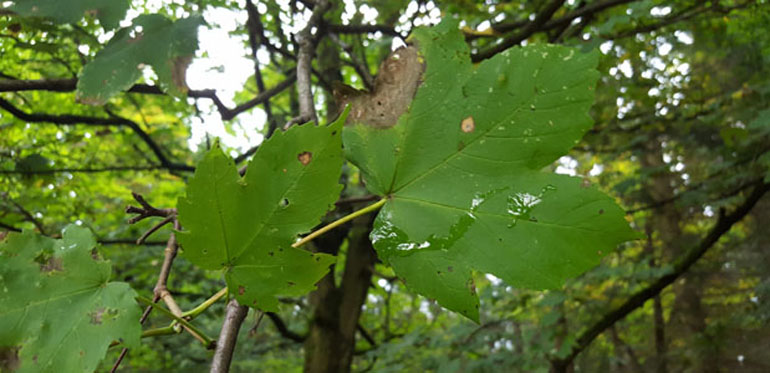Sycamore for wood production
The objective of this project is to establish a field experiment of sycamore to test different provenances and silvicultural practices. These include spacing at stand establishment and pruning and thinning.

Sycamore (Acer pseudoplatanus) also known as tysklönn in Swedish.
Sycamore (Acer pseudoplatanus) is currently spreading in southern Sweden, where it is considered a nuisance and is neglected in silviculture. However, sycamore has a good growth potential (better than beech and oak), it is easy to regenerate (hence the rapid natural spreading) and the timber fetches high prices in the European market (the market average for premium saw logs of sycamore is similar to that of oak and veneer qualities sell at substantially higher prices). Sycamore is already well adapted to southern Sweden and the expected future climate will further promote its spread and competitiveness (the natural distribution range stretches to northern France, Germany and Poland and sycamore is known to grow well in Denmark and Great Britain). Based on these premises it is relevant and timely to test sycamore for wood production in Sweden.
This project focuses on planted sycamore for wood production. The objective is to establish a field experiment to test different provenances and silvicultural practices. The experiment will investigate combined effects of site, genetic origin, spacing at stand establishment and, in future projects, subsequent pruning and thinning practices. The experiment will be replicated at two different locations suitable for sycamore. Each location will include three different provenances established at three different spacings.
This application concerns the establishment phase, i.e. three years. During the project period, survival, early height growth, stem form, forking frequency and biotic and abiotic damages will be analysed depending on provenance and site characteristics.
The experiment will test a range of scientific hypotheses and show the consequences of different management practices and how sycamore can be managed purposefully. The experiment will contribute to a differentiated approach to management of sycamore in Sweden and to sustainable practices for wood production.
Ämne: Skogsskötsel
Startår: 2017

